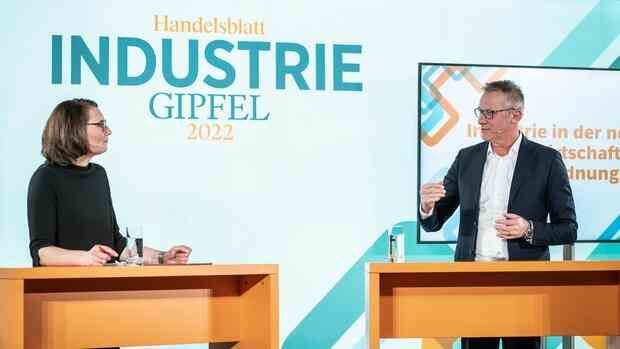“The trade barrier is there – and the Americans will not be impressed at all by our reaction,” explains Rolf Najork.
Duisburg The Russian war of aggression in Ukraine, trade conflicts with China and the energy crisis are putting increasing pressure on the industry. The companies are demanding a European response to the multiple crises. “We have to get off this prevention debate – and think again in terms of technical opportunities,” said Bosch CEO Rolf Najork on Thursday at the Handelsblatt industry summit in Duisburg.
Since August, the US government’s anti-inflation program has added to the difficulties for German industry. The “Inflation Reduction Act” (IRA) is intended to guarantee companies billions in subsidies and tax benefits in the USA – which could be to the detriment of European competitors.
The climate policy part of the program provides for investment aid, tax credits and write-offs totaling 386 billion dollars. Among other things, they should flow into the expansion of renewable energies, competitive electric car and battery production and the hydrogen industry.
Bosch manager Najork warns of a subsidy race
In particular, the so-called localization regulations in the package are causing tension. In many cases, the payment of US subsidies is linked to the condition that the products concerned be manufactured in whole or in part in the USA.
Top jobs of the day
Find the best jobs now and
be notified by email.
European companies feel massively disadvantaged by this and fear for market access. “We see this as a subsidy race – and we have a right to do so,” said Bosch board member Najork. “The trade barrier is there — and Americans will not be impressed at all by our response.”
Europe is also not very assertive against trading partners from the USA and China. “We have to make the companies stronger and also invest in the USA in order to benefit from these programs,” said Najork in an interview with Kirsten Ludowig, deputy editor-in-chief of the Handelsblatt.
Nobody will give up a highly profitable China business if they are already invested there. Rolf Najork, member of the Bosch board of management
German entrepreneurs agree: European industry must become more resilient and independent if it wants to remain an export nation. “In a global world, you need a global footprint,” says Najork.
Above all, the current debate about reducing dependence on China is unrealistic in one respect: “We are asking whether it is possible to leave China. But many companies would not be so successful in Germany if they didn’t have such strong business in China,” said the manager. Although China is a strategic risk, it is also an opportunity: “Nobody will give up a highly profitable China business if they are already invested there.”
Katarina Barley, Vice President of the European Parliament, even described the US program at the Handelsblatt industry summit as an “unfriendly act” towards Europe. However, the initiative must also be interpreted as a good sign in the climate crisis: “The USA is finally getting serious about climate protection,” said the SPD politician.
There are three options for a European response:
- On the one hand, protectionist measures that could result in a new trade war.
- Secondly, one could, for example, subsidize one’s own hydrogen industry.
- As a third option, Barley mentioned an agreement with the USA: “Europe could be included in the IRA to the same extent as Canada and Mexico.”
However, Barley did not speak out in favor of a lawsuit before the World Trade Organization (WTO), as EU Internal Market Commissioner Thierry Breton has threatened. Such a step will not bring a solution in the end, instead there must be a rapprochement with the USA – and a stronger effort by Europe itself. “An escalation can not be in any interest – not in the American one,” explained Barley. Against the background of other system rivals such as Russia and China, the relationship between the USA and Europe should not deteriorate.
Barley misses “welcome culture for skilled workers”
However, German industry will not be able to completely decouple itself from China, Barley also said. “It is important that the locations operated in Germany continue to have a future. That depends on the energy and also on the subject of skilled workers,” said Barley.
We have to take a position geopolitically, we can no longer be neutral. Michael Hüther, Director of the German Economic Institute (IW)
Especially with regard to the shortage of skilled workers in industry, Germany must make an active effort: “We do not have a welcoming culture for skilled workers.”
European politics is now under pressure. “We have to take a geopolitical position, we can no longer be neutral,” said Michael Hüther, director of the German Economic Institute. Investments must now be made primarily in Europe in order to continue to be important in the geopolitical order. In view of the goal of curbing China’s economic power, one must cooperate with the USA.
Hüther explained that the shortage of skilled workers should also be addressed with the help of the Skilled Immigration Act. “We have to increase the country’s investments in education and the country’s integration performance – but at the same time rationalize it in many places,” said Hüther.
More: The Stranger Friend: Is a trade war looming between the US and the EU?
